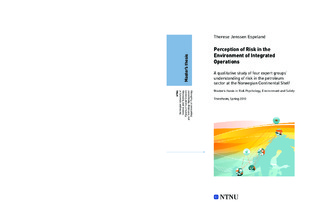| dc.contributor.advisor | Sjöberg, Britt-Marie Drottz | nb_NO |
| dc.contributor.author | Espeland, Therese Jenssen | nb_NO |
| dc.date.accessioned | 2014-12-19T14:25:07Z | |
| dc.date.available | 2014-12-19T14:25:07Z | |
| dc.date.created | 2010-12-17 | nb_NO |
| dc.date.issued | 2010 | nb_NO |
| dc.identifier | 379467 | nb_NO |
| dc.identifier.uri | http://hdl.handle.net/11250/265109 | |
| dc.description.abstract | A general interest in risk perception and the current implementation project of integrated operations (IO) at the Norwegian Continental Shelf (NCS) laid the foundations for this thesis. Preceding effort from research teams and pilot projects has explored the effects and changes of IO to make sure the implementation of generation one and generation two will be safe. Still, the use of IO is expected to influence and possibly alter the risk picture and risk assessments of petroleum production. The RIO-project was initiated to develop new knowledge and frameworks for reasoning, as a basis and platform for risk assessment in relation to petroleum production in the environment of IO. On a request from the RIO-project this thesis explores how actors from different expert groups, in relation to petroleum production, perceive risk and risk management of IO. The findings are intended to generate ideas and information that can be utilised for suggestions on how employees in the petroleum industry could avoid or manage problems due to risk of IO. To gain insight on the subject matter a qualitative, semi-structured interview was conducted. The study consists of 13 respondents that were divided into four expert groups on the basis of their current place of work: industry members, researchers, supervisors and risk analysis consultants. The research findings were categorised and analysed according to some methods from Grounded Theory. The findings can be used to map out how these 13 actors in the petroleum sector perceive risk and risk management in relation to IO. It is further concluded that their risk perception differs and seems to be independent of the distribution across expert groups. However, as the study comprises relatively few respondents the results are insufficient to infer anything about the common perception of risk in the sector or in the expert groups. However, the results are significant and important in that they shed light on current beliefs about risk, especially in relation to the transition between generation 1 and generation 2. | nb_NO |
| dc.language | eng | nb_NO |
| dc.publisher | Norges teknisk-naturvitenskapelige universitet, Fakultet for samfunnsvitenskap og teknologiledelse | nb_NO |
| dc.subject | Social and Behavioural Science, Law | en_GB |
| dc.title | Perception of Risk in the Environment of Integrated Operations: A qualitative study of four experts groups' understanding of risk in the petroleum sector at the Norwegian Continental Shelf | nb_NO |
| dc.type | Master thesis | nb_NO |
| dc.source.pagenumber | 74 | nb_NO |
| dc.contributor.department | Norges teknisk-naturvitenskapelige universitet, Fakultet for samfunnsvitenskap og teknologiledelse | nb_NO |
| dc.contributor.department | Norges teknisk-naturvitenskapelige universitet, Fakultet for samfunnsvitenskap og teknologiledelse, Psykologisk institutt | nb_NO |
